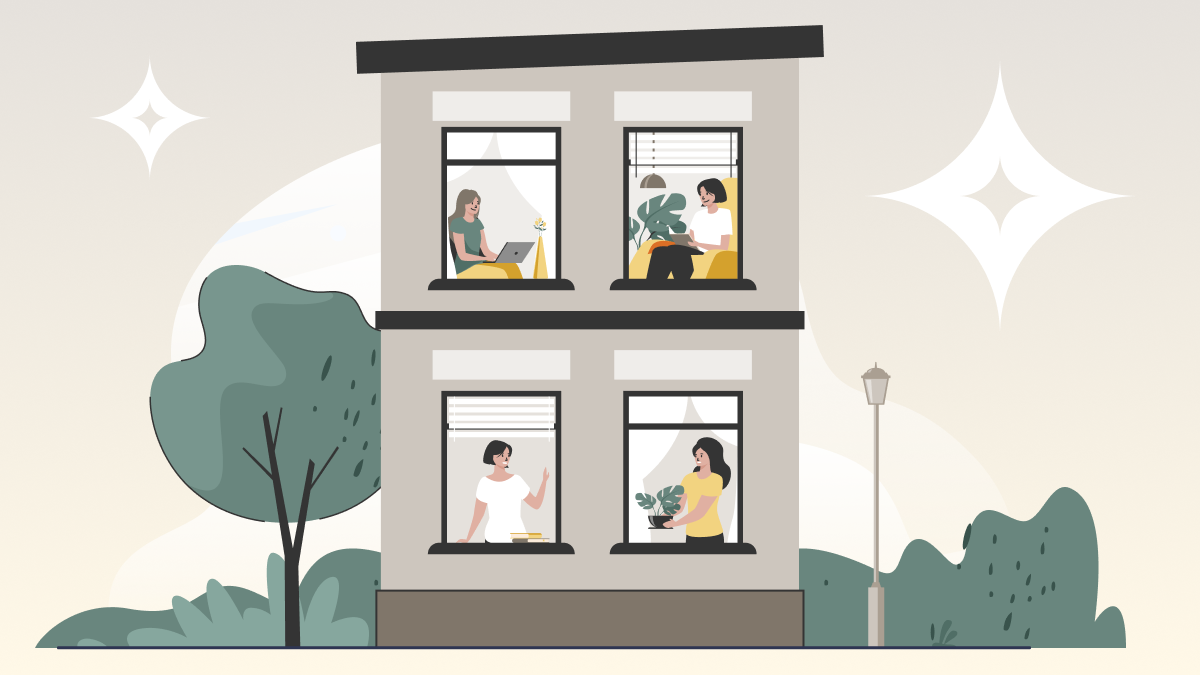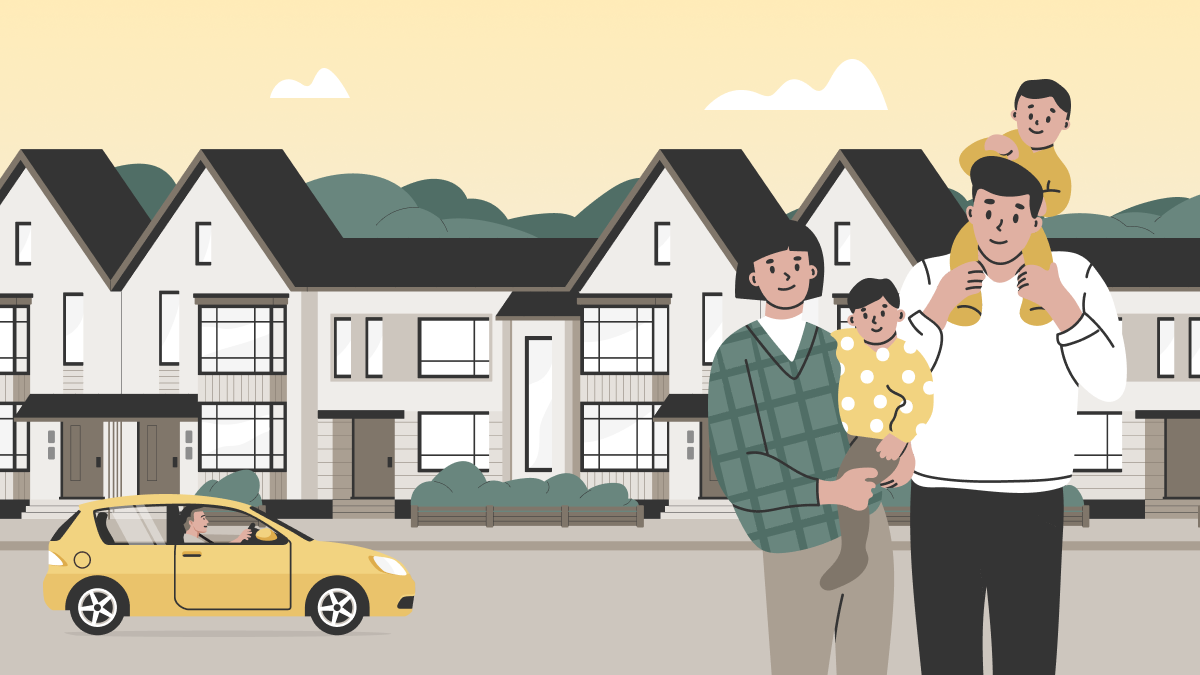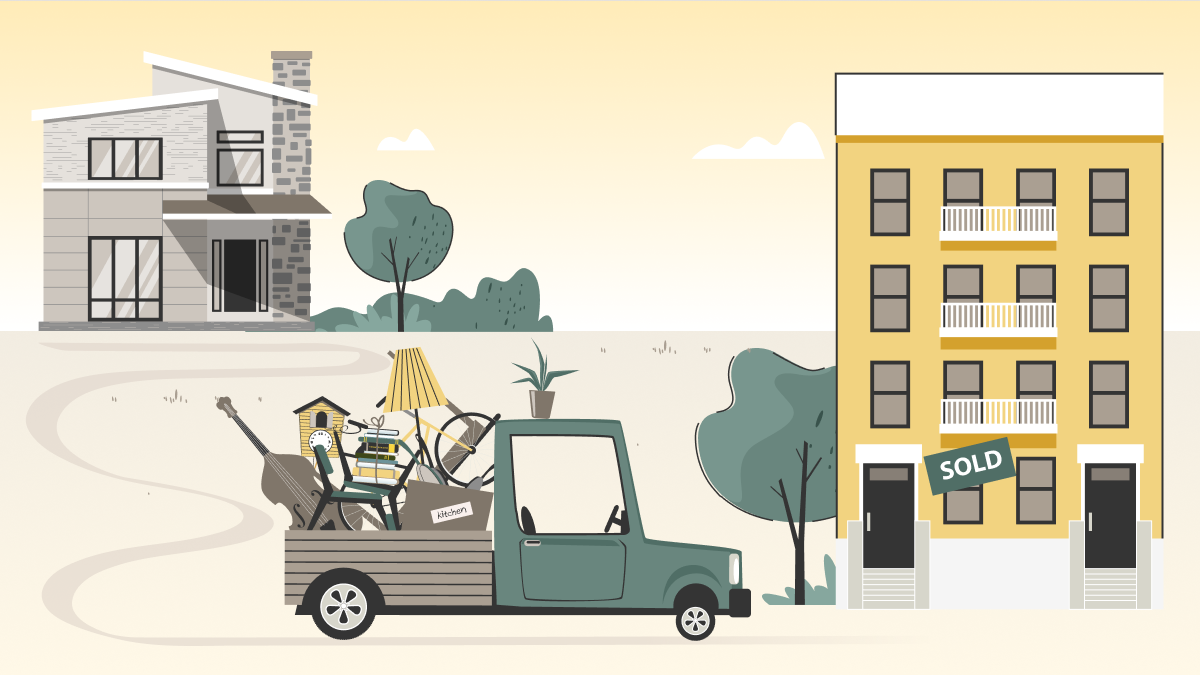7 Steps to Buying Your Perfect Condo
Venturing into the condo market is not just about finding a new place to live; it's about choosing a lifestyle that suits you. A condo is more than walls and windows; it's a community.
In this guide, you'll discover the practical steps in forming your own condo-buying checklist to navigate this journey with ease. We'll walk you through each stage, ensuring you have the insight necessary to seal the deal with confidence.
What Exactly Is a Condo?
A condominium, or condo, is your private home within a larger multi-unit community. You own your individual unit – the space inside your walls – but you also share ownership of common areas with your neighbors. These areas might include a gym, pool, or social rooms.

Here's what sets a condo apart: while you have control over your own unit, the Homeowners’ Association (HOA) oversees the common spaces. This means you contribute to a fund, typically through monthly fees, that covers the upkeep of these shared areas.
It's a setup that offers the personal space of home ownership along with community amenities, minus the hassle of maintaining them all by yourself.
Condo vs. Apartment vs. House
Deciding between condos, apartments, and houses involves understanding their distinct lifestyle and financial impacts. We provide a concise comparison of owning a condo, renting an apartment, and buying a house to guide your choice.
|
|
Owned Condo |
Rented Apartment |
Owned House |
|
Ownership |
You own your unit and share common areas like gardens, pools, or gyms. |
Rented, not owned. The landlord owns the property. |
You own the building and the land it sits on. |
|
Type of Costs and Fees |
HOA fees for maintenance of common areas, mortgage, taxes, and insurance. |
Rent, insurance, and possibly some utilities. Other maintenance is covered by the landlord. |
All repairs and maintenance, mortgage, taxes, and insurance. |
|
Maintenance |
You are responsible for in-unit maintenance and repair. The HOA handles common area maintenance. |
None. The landlord is responsible for maintenance. |
You are responsible for all maintenance and repairs, inside and out. |
|
Best For |
Individuals or small families looking for property ownership without the hassle of exterior maintenance. |
Those seeking flexibility, not ready to invest in owning property, or unable to qualify for a mortgage. |
Those seeking privacy, space, the ability to customize their living space, and willing to handle maintenance and costs. |
What to Know Before Buying a Condo
Stepping into the condo market requires a clear understanding of what you're signing up for beyond just purchasing your unit. Here's what you should consider:
- Association Fees: Owning a condo means contributing to the Homeowner’s Association (HOA) fees. These fees go towards maintaining common areas and amenities, like pools, spas, gyms, and more. HOA fees vary based on a range of factors, including the location of the property, the size of the condo, the amenities provided by the HOA, and the overall cost of living in the area. Generally, HOA fees can range anywhere from $100 to $700 or more per month.
- Community Rules: Each condo community has its own set of rules or covenants, conditions, and restrictions (CC&Rs). These could include guidelines on pet ownership, renovation possibilities, and noise levels. Review these rules carefully to ensure they align with your lifestyle.
- Management Quality: A well-managed condo can make life smoother. Investigate how the property is managed. Are resident concerns addressed promptly? Is the building well-maintained? Talking to current residents or reading minutes from HOA meetings can offer valuable insights. Also, learn about the condo board members who make significant decisions regarding the community. Understand their backgrounds, their approach to governance, and how they interact with residents.
- Insurance Coverage: Understand what the HOA's insurance covers and what you need to insure individually. The association's policy typically covers common areas, while you might need a robust homeowners’ insurance plan to cover everything inside your unit.
- Resale Value: Think about the future. Factors like location, condition, and community reputation can influence your condo's resale value. Look for a condo that fits your current needs and has potential for appreciation.
- HOA's Financial Health and Financing Implications: Review the financial health of the condo association. The association's financial records can significantly impact your ability to secure financing. Lenders take into account the HOA's financial stability when approving loans, so a condo in a community with solid financial standing may facilitate a smoother financing process.
- Special Assessments: Be aware of special assessments – these are one-time fees for significant expenses like major repairs or upgrades. If the HOA doesn’t have enough reserve funds to cover these expenses, individual homeowners will be required to cover the cost.
How To Buy a Condo: 7 Steps
Buying a condo is a step-by-step journey, each phase paving the way to a successful purchase. Here's how you can confidently navigate this process, ensuring each decision aligns with your goals and financial plan. Here are the steps to buying a condo.
Step 1: Begin Your Search
Start your condo hunt by pinpointing your preferences, such as desired location, must-have amenities, and budget constraints. You can search for yourself or hire a real estate agent.

Option 1: If you decide to conduct the search yourself, you take charge of the entire search process. You can utilize online platforms such as Zillow and Realtor to explore available listings. This method allows you to filter through condos based on specific criteria like location, price, and desired amenities.
However, this option comes with its advantages and drawbacks:
Pros:
- Complete control over the search process.
- Freedom to explore listings at your own pace.
- Potential savings on agent fees.
Cons:
- Requires significant time and effort to research and schedule viewings.
- Less access to market insights and off-market listings.
- Navigating negotiations and paperwork without professional guidance.
Option 2: If you don't want to do it yourself, you can opt for a real estate agent – a professional to guide you through the search. Agents are connected with professional networks like the National Association of Realtors (NAR) and possess in-depth knowledge of the local market. They can provide personalized listings, offer insights on market trends, and handle much of the transactional legwork.
This option also comes with advantages and drawbacks:
Pros:
- Expertise in market trends and property values.
- Access to a broader range of listings, including those not publicly listed.
- Professional handling of negotiations, paperwork, and transaction details.
- Cons:
- It involves agent fees, usually a percentage of the sale price.
- Less direct control over the search process.
- Buyers may feel pressure to bid higher than they can afford.
Step 2: Get Pre-Approved
Securing a pre-approval for a mortgage is a preliminary step that serves as a financial readiness check. It's not a final mortgage approval but rather an assessment by a lender to determine how much they would be willing to lend based on your financial status.
This involves reviewing your income, debts, assets, and credit score. Getting pre-approved is beneficial before attending showings as it gives you a clear idea of your budget, shows sellers you're serious about buying, and can speed up the purchasing process once you find the right condo.
Aside from understanding pre-approvals and setting a budget, make sure you understand down payment requirements. The condo's price, location, and credit score could also influence your specific down payment. On average, down payments range between 3% and 20% of the sale price.
If you are pre-approved, you will receive a pre-approval letter indicating the amount the lender is tentatively willing to lend to you. While not mandatory, having one in hand is highly beneficial. It acts as a financial credibility badge when you're negotiating with sellers, showing that you have the backing of a lender to complete the purchase.
However, be mindful that pre-approval letters have an expiry date, usually 60 to 90 days. This timeframe encourages timely house hunting and ensures the financial assessments are up-to-date.
Step 3: Attend Showings and Research
As you attend condo showings, look beyond the surface. Research the condo's HOA, including the board members' profiles, financial history, and the age of the building. Make sure to also inquire about the financial statements and reserve funds of the HOA.
A robust reserve fund, typically above 25% of the HOA's annual budget, signals sound financial health and foresight. This fund is used for major repairs or unexpected expenses, safeguarding against sudden, hefty assessments to owners.
Understand the purpose and size of the HOA fees. These fees maintain common areas like gardens, pools, and fitness centers. They also fund amenities such as security services, community events, and potentially utilities like water and trash removal.
Next, inquire about the condo's insurance coverage to understand what's protected under the policy. Also, investigate property tax rates, as they will be a recurring cost in your budget. This comprehensive approach to your condo search helps establish a clear, full-spectrum view of what life will be like in your new home.
Finally, if you're considering buying a condo to rent out in the future, it's good to know the HOA's rental policy. Some associations have restrictions on renting, which could impact your plans. Questions to ask when buying a condo include whether rentals are allowed, the minimum rental duration, and any leasing fees.
Step 4: Make an Offer
If you are working with an agent, you benefit from their expertise, market insights, and negotiation skills. Your agent will facilitate the process by helping you determine a fair and competitive price by analyzing sales in the area and considering current market conditions.
Your agent will then draft the offer letter, which includes the price, contingencies (such as financing approval, home inspection, and appraisal), and proposed timeline for closing. After submitting the offer to the seller's agent, your agent will negotiate on your behalf and act as the main point of contact between you and the seller.

If you choose to navigate the condo-buying process without a real estate agent, you take on a more hands-on role, requiring diligent research and a proactive approach. This decision can save you the cost of commission fees, but it requires a comprehensive understanding of the local real estate market, including pricing trends and comparable sales.
Without an agent's expertise, you'll need to negotiate offer terms directly with the seller or their agent. You will also need to draft a detailed offer letter and decide on a proposed timeline for closing.
If your offer is accepted, you will be expected to put down an earnest money deposit to show your good faith and intent to purchase the property. Earnest money is paid after the seller accepts the buyer’s offer but before the actual purchase of the property.
While the earnest money amount varies, it is usually around 1% to 3% of the purchase price. The money is held in escrow until closing, and if the deal goes through, the earnest money is applied toward the down payment. If the deal falls through under specified conditions, the earnest money may be refunded – however, in most cases, it is forfeited.
Step 5: Apply for the Loan
Once your offer on the condo is accepted, you'll enter a phase to finalize your home purchase. You'll typically have 30 to 45 days to secure funding. Although pre-approval gave you a head start, at this stage, you’ll need to formally apply for the mortgage.
Here are some financing options available to prospective condo buyers:
- Conventional Loans: These are standard loans banks offer, usually with fixed or adjustable rates over 15 to 30 years. Your eligibility hinges on your credit score and down payment size. A credit score of at least 620 is typically needed. Down payments can be as low as 3% for personal properties, though 10% to 20% is more common. Note that private mortgage insurance is required if your down payment is less than 20%.
- FHA Loans: Offered by the Federal Housing Administration, these loans are more accessible, requiring lower down payments and less stringent credit requirements. To qualify, ensure the condo is in a building with at least four units. You can finance up to 96.5% of the home loan and some closing costs. However, be sure your building meets FHA approval criteria, which include factors like a high percentage of owner-occupied units, no pending legal actions against the property, and a healthy financial status for the HOA.
- VA Loans: Tailored for veterans, current military members, and some spouses, VA loans offer benefits like potentially lower interest rates and no down payment requirements. The approval process can be lengthy, and certain conditions apply regarding HOA dues, owner-occupancy rates, and the development's status.
When applying for a mortgage, you'll need to present income proof, tax returns, and your credit report. If you can't secure financing within the agreed period, the deal might fall through, and you might lose your earnest money deposit.
Step 6: Inspection/Appraisal
If you successfully secure your loan, the next step in buying a condo is the inspection and appraisal. A professional inspection identifies any hidden problems in the condo. This includes examining the plumbing, electrical systems, heating, ventilation, and air conditioning (HVAC) and checking the windows, doors, and the structure itself.
At this stage, the seller will provide a disclosure that describes the property's condition and history, detailing any known defects, repairs, and renovations. It's designed to offer buyers a clear understanding of what they are purchasing, ensuring there are no surprises post-transaction.
If a major problem is detected, the signed agreement's contingencies might allow renegotiation or withdrawal from the deal, safeguarding the buyer's investment and aligning the purchase with the property's true value and condition.
Step 7: Closing the Deal
Approaching the final stage, ensure all is in order before sealing the deal. During the final walkthrough of the property, confirm the condo's condition and verify that all agreed-upon repairs are completed. It's also the time to ensure that the property matches your expectations based on the contract.

During the closing, you will review and sign several important documents. This includes the mortgage agreement, the title transfer documents, insurance policies, and inspection reports. In most cases, you will also need to present condo insurance documents that verify your coverage.
At closing, you will pay the remaining portion of your down payment, as agreed in your purchase contract. Once all the steps are completed, the seller officially passes the property title to you, marking the transfer of ownership. This legal step secures your ownership rights to the property.
The Pros and Cons of Owning a Condo
Owning a condo comes with unique benefits and challenges that can significantly shape your living experience. Understanding these can help you decide if a condo aligns with your lifestyle and financial goals. Make sure to consider the following pros and cons of buying a condo:
Benefits of Buying a Condo
- Equity Growth: Unlike rent, condo payments contribute to owning a valuable asset that may increase in worth over time.
- Interior Autonomy: You have the freedom to modify and decorate the inside of your condo, turning it into your personalized space within the community's guidelines.
- Reduced Maintenance Responsibilities: The HOA manages exterior and common area upkeep, freeing you from tasks like lawn care and major repairs.
- HOA Amenities: Enjoy facilities such as pools, fitness centers, and social spaces without the personal responsibility of maintenance.
- Cost-Effective: Generally, condos are more budget-friendly than single-family homes, offering an accessible path to property ownership.
- Community Environment: Condo living fosters a sense of togetherness, making it ideal for individuals who value community living.
Challenges of Buying a Condo
- HOA Fees: Ownership involves mandatory HOA dues, which cover community services and maintenance but can be a substantial annual expense.
- HOA Guidelines: You'll need to adhere to your HOA's rules, which might include seeking approval for certain changes to your condo or facing fines for non-compliance.
- Limited Land Ownership: Your property rights are confined to the interior of your unit, with outdoor and common areas owned collectively by the community.
- Financing Hurdles: Obtaining a mortgage for a condo can be more complex, requiring both your and your condo's eligibility to meet specific lender criteria.
- Privacy Constraints: Sharing walls with neighbors and common outdoor areas means less privacy than a detached home might offer.
- Unexpected Costs: Although the HOA covers many expenses, you might still face unforeseen costs for major repairs or improvements to communal spaces.
Are Condos a Good Investment?
Buying a condo as an investment can be a smart financial move when done with careful consideration. Condos often serve as an accessible route to homeownership, especially in sought-after areas where traditional houses may be out of reach. They also hold the potential for value growth over time. However, to truly gauge whether a condo is a sound investment, several factors need your attention:
- Market Dynamics: Understanding current market trends is key. Is the area experiencing growth? Are similar properties in demand? A condo in a growing or stable market is more likely to appreciate in value.
- Location Benefits: Location is a key player in real estate investment. Condos in prime locations, close to amenities, work, and leisure activities, tend to retain or increase their value and attract potential renters or buyers.
- HOA Financial Stability: Investigate the financial health of the condo's HOA. A well-managed association with solid reserve funds and a history of wise financial decisions can mean fewer unexpected costs and well-maintained property.
Bottom Line
Securing the keys to your new condo is more than a transaction; it's the beginning of a new chapter filled with possibilities and the comfort of a space that's truly yours. Equipped with tips for buying a condo for the first time, you're prepared to start your homeowner journey.
FAQ
When considering a condo purchase, you likely have many questions about the benefits, costs, and logistics. Understanding these key points can help you make an informed decision tailored to your lifestyle and financial situation.
Is It Worth Buying a Condo?
Deciding to buy a condo involves considering your lifestyle and preferences. Often situated in bustling urban areas, condos are perfect for those who thrive in the heart of the city and appreciate having amenities and businesses within walking distance.
Also, owning a condo might be an ideal choice if you're a first-time homebuyer, someone seeking a low-maintenance lifestyle, or an older individual looking to downsize. It offers the perks of home ownership without the extensive upkeep of a single-family home and positions you in vibrant, central locations.
However, aligning the condo's characteristics with your personal needs and tolerance for community living is key to making a choice you'll be happy with.
How Much Does It Cost to Buy a Condo?
The price of a condo varies based on location, size, and features. As of 2023, it costs about $357,600 to buy a condo in the U.S. However, prices can significantly increase based on location.
In some cases, condo prices are calculated based on the square footage of the home. As of 2022, the average cost for a condo in California was around $752 per square foot.
To put it into context, a 1,500-square-foot condo would cost over $1 million, not including the HOA fees, closing costs, inspection fees, down payment, and earnest money.
How Long Does It Take to Buy a Condo?
Purchasing a condo can take anywhere from several weeks to a few months. This timeline depends on various factors, including how quickly you can secure financing, the state of the market, and how fast you find a condo that ticks all your boxes.
Are Condos Good to Rent?
Buying a condo to rent out can be viable, especially in urban and vacation areas. If your HOA allows, you can rent out your apartment as a way to earn passive income. For instance, average California rental properties earn landlords about $2,795.
However, keep in mind that leasing fees, HOA costs, and potential repair costs will be your responsibility as the landlord. When determining a rental cost, make sure it at least covers the mortgage, leasing costs (if any), and HOA fees. Also, make sure a portion of the rental income goes towards emergency repairs. Finally, your rental cost should also include a profit margin for yourself.
Are Condos Good for Airbnb?
Using your condo for Airbnb could be profitable, particularly in sought-after locations. Make sure you're clear on the HOA's stance on short-term rentals and are aware of any additional costs or regulations that might apply.
Sources
- U.S. Department of Housing and Development. “Condominiums.” Accessed Jan. 30, 2024.
- Rocket Homes. “How Much Does a Condo Cost in 2023?” Accessed Jan. 30, 2024.
- Statista. “Median square footage sales price of single-family homes and condos in California as of March 2022, by region.” Accessed Jan. 30, 2024.
- Zillow. “California Rental Market.” Accessed Jan. 30, 2024.



